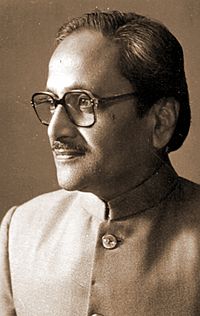Beohar Rammanohar Sinha
| Beohar Rammanohar Sinha व्यौहार राममनोहर सिंहा |
|
|---|---|
 |
|
| Born |
15 June 1929 Jabalpur, India |
| Died | 25 October 2007 (aged 78) Indore, Madhya Pradesh, India |
| Nationality | Indian |
| Education | Shantiniketan, Chungking, Peking |
| Known for | Painting (Revivalist artist) |
| Notable work | Constitution of India |
Beohar Rammanohar Sinha (Hindi: व्यौहार राममनोहर सिंहा, Vyauhar Rammanohar Simha or Ram-da) was an Indian artist who is best known for his illustrations in the original final manuscript of Constitution of India, including the complete Preamble-page, which was brought to fruition in 1949 as one of the most beautiful Constitution in the world in addition to being the most comprehensive one. He is also known as a cultural ambassador of India who disseminated Indian art in the Far East, and brought Oriental Art to India. His works are housed in numerous prestigious public and private collections throughout the world and his murals still adorn the walls and gigantic dome of Jabalpur’s historic Shaheed-Smarak or Martyrs’-Memorial Auditorium even after more than half a century, though now demanding conservation.
Rammanohar always signed his artworks in the cursive Devanagari-script, either in short Ram or in full Rammanohar, but rarely scribed his surname. Most of his later paintings bear a unique red seal with his surname Sinha, primarily in Devanagari-script but also sometimes in the Pinyin-script, in addition to his said signatures in ink.
Rammanohar was born on 15 June 1929 in the then Jubbulpore, the largest and most important city of British India’s Central Provinces. He was the youngest of the three sons of renowned Gandhian Beohar Rajendra Simha - an acclaimed scholar, historian, theologian, littérateur,Hindi-activist,Ramayana-authority and, to a lesser extent, a journalist and a politician - who happily embraced numerous terms as political-prisoner while leading the Indian independence movement as a part of Satyagrah.
...
Wikipedia
